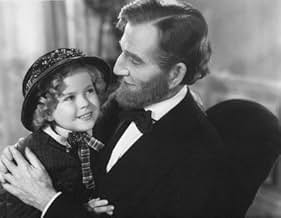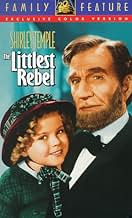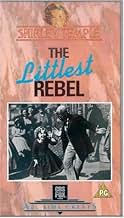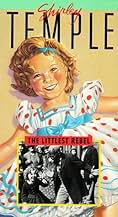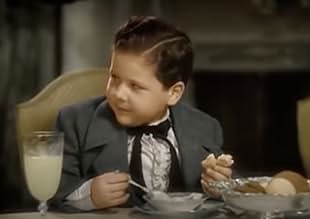Adicionar um enredo no seu idiomaShirley Temple's father, a rebel officer, sneaks back to his rundown plantation to see his family and is arrested. A Yankee takes pity and sets up an escape. Everyone is captured and the off... Ler tudoShirley Temple's father, a rebel officer, sneaks back to his rundown plantation to see his family and is arrested. A Yankee takes pity and sets up an escape. Everyone is captured and the officers are to be executed. Shirley and "Bojangles" Robinson beg President Lincoln to interc... Ler tudoShirley Temple's father, a rebel officer, sneaks back to his rundown plantation to see his family and is arrested. A Yankee takes pity and sets up an escape. Everyone is captured and the officers are to be executed. Shirley and "Bojangles" Robinson beg President Lincoln to intercede.
- Direção
- Roteiristas
- Artistas
- Prêmios
- 4 vitórias no total
- Sgt. Dudley
- (as Guinn Williams)
- Birthday Party Guest
- (não creditado)
- Birthday Party Guest
- (não creditado)
- Black Boy
- (não creditado)
- Party Guest
- (não creditado)
- Birthday Party Guest
- (não creditado)
- Railroad Ticket Clerk
- (não creditado)
- Birthday Party Guest
- (não creditado)
- Birthday Party Guest
- (não creditado)
- Direção
- Roteiristas
- Elenco e equipe completos
- Produção, bilheteria e muito mais no IMDbPro
Avaliações em destaque
The second is a chance to talk to your children about the way black characters and white characters interact in this film. Some younger children may be confused by the divide between the black characters and the white characters (especially those who attend racially-diverse schools,) but this is a good time to explain to them the racist attitudes of the time period, and ask them how it makes them feel.
The best way to combat racism is not to sweep it under the rug, but to teach children where we were, how far we've come, and how far we still need to go. Give children the credit they deserve, they will understand.
This film is a perfect opportunity to relate to your children and instill guidance.
The black people are not only less intelligent than the whites (notice the girl so dumb she can't even remember a single line her mother told her to memorise to impress the young white child star - or perhaps she's just so nervous in the presence of the superior species that she can't remember), but they're completely happy being enslaved.
They absolutely love being told what to do by the six year old landowner's daughter, and the neighbourhood slaves just wait around for young Shirley to lavish some attention on them.
The thing I most regret about the film was that they forced the blacks to dance and entertain their white hosts like a bunch of chained elephants or circus freaks.
Its always a bad sign when the civil war is portrayed as a distruption to the desired state of affairs, as it is here and in Gone with the Wind.
1/5
Only youngsters, who don't yet understand that the only difference between white folks and black folks is skin pigment, which only evolved from a group of people living in an ultra-sunny climate for years, will be able to enjoy this film. But perhaps its better for society if you don't show it to them - the young are so impressionable, after all.
UPDATE: Can I point out that I've noticed people don't like this review, and I'm not surprised; its intentions were so innocent, it feels a shame to accuse it of causing offense, but unfortunately, I'd still suggest this one not be shown to impressionable kids for the reasons I have outlined above.
This picture is set in Civil War South, and steps lightly through the minefield of the racism of slavery. Not sure if this picture could be made today, as racial tensions have been stewing since the Civil Rights Act of 1965, but this was 1935, and audiences had a better historical sense than is found nowadays. Just watch and enjoy the entertainment phenomenon that was Shirley Temple, Hollywood's all-time greatest scene-stealer.
6/10 - Website no longer prints my star ratings.
Você sabia?
- CuriosidadesBoth John Boles and Bill Robinson nearly drowned while trying to cross a raging, 15-foot river for an escape scene that was cut from the film.
- Erros de gravaçãoWhen the Union soldiers are caught looting, the commanding officer orders them to be flogged. The US Army according to the "History of the United States Army" stopped flogging at the beginning of the Civil War in 1861--this scene is obviously later in the war as Union forces are occupying the south.
- Citações
Virginia 'Virgie' Cary: [singing] Oh, I eat watermelon and I have for years. Sing Polly-Wolly-Doodle all the day! I like watermelon but it wets my ears. Sing Polly-Wolly-Doodle all the day!
- Versões alternativasAlso available in a computer colorized version.
- ConexõesFeatured in Of Black America: Black History: Lost, Stolen or Strayed (1968)
- Trilhas sonorasPolly Wolly Doodle
(1880) (uncredited)
Traditional
Modified Music by Sidney Clare (1935)
Modified Lyrics by Buddy G. DeSylva (1935)
Sung by Shirley Temple with Bill Robinson
Reprised at the end by Shirley Temple
Principais escolhas
- How long is The Littlest Rebel?Fornecido pela Alexa
Detalhes
- Data de lançamento
- País de origem
- Idioma
- Também conhecido como
- The Littlest Rebel
- Locações de filme
- Empresa de produção
- Consulte mais créditos da empresa na IMDbPro
- Tempo de duração
- 1 h 13 min(73 min)
- Cor
- Proporção
- 1.37 : 1


